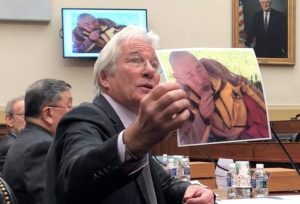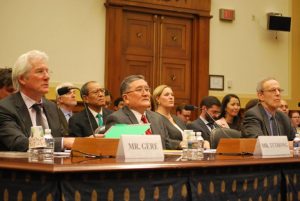
Richard Gere holding a photo of Tenga who self-immolated recently in protest against the Chinese government Photo: tibet.net
The renowned Hollywood actor Richard Gere, Chair of the International Campaign for Tibet, testified at a United States Congressional hearing on US Tibet policy in Washington, DC on December 6.
He spoke about the Tibetan monk,Tenga, who self-immolated last month. He went on to outline the urgent need to look into the situation of the Tibetan people inside Tibet and expressed concern about China’s accountability to international law as it becomes more powerful.
Mr Tenzin Tethong, Director of the Tibetan Service, Radio Free Asia (RFA) and MrCarl Gershman, President of National Endowment for Democracy (NED), were also present at the hearing as witnesses.
The two hour long hearing was hosted by the US Congressional Subcommittee on Asia. The Pacific and Subcommittee Chairman Mr Ted Yoho opened the hearing with a statement that raised the issues of both the Reciprocal Access to Tibet Act and the Concurrent Resolution on Tibet.
Congressman Yoho said: “Human rights and personal freedoms in Tibet are already in a poor and worsening state. According to the State Department’s 2016 human rights report, the government of China engages in the severe repression of Tibet’s unique religious, cultural, and linguistic heritage by among other means, strictly curtailing the civil rights of the Tibetan population.”

Photo: tibet.net
In his testimony and recommendations Richard Gere said “Since the nineties, subsequent US Administrations and Presidents have supported the call of His Holiness the Dalai Lama for genuine autonomy for the Tibetan people and have called on China to respect the distinct identity of the Tibetan people; including their language, their religion and their culture, and to stop the persecution of Tibetans.
The respect for the identity of a people, of their religion, is something the American people understand very well. Before being politicians, you are human beings who understand that oppression cannot be tolerated; you understand that all human beings have the right to the pursuit of happiness. This is what His Holiness the Dalai Lama continuously reminds us; to look at what unites us as human beings, not what divides us.”
He also pointed out that “During President Trump’s recent visit to China, the White House stated that the issue of human rights was raised with Chinese authorities. While this is good, President Trump and Secretary Tillerson did not publicly highlight the lack of respect of human rights in Tibet or the need for China to restart the dialogue process with the Dalai Lama; this is out of line with the provisions of the Tibetan Policy Act.It is now critical that the US Congress takes concrete initiatives to make sure that the Tibetan Policy Act is fully implemented and that China understands that the US stands with the Tibetan people.”
US Congressional hearings are the principal formal method by which Congressional committees collect and analyse information in the early stages of legislative policymaking.Hearings usually include oral testimony from witnesses and questioning of the witnesses by members of Congress.




 Print
Print Email
Email